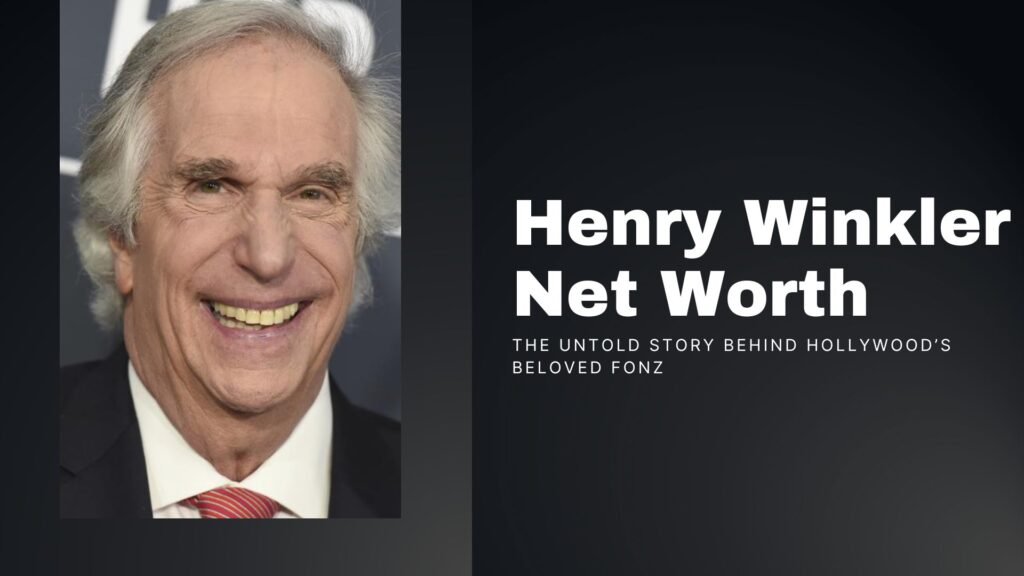Henry Winkler is a beloved actor, best known as “The Fonz” from Happy Days. His net worth is estimated to be around $40 million in 2025, though sources vary from $20 million to $50 million. How did he build his wealth? This article tells the story of Winkler’s career, from acting and producing to writing and investing, highlighting the smart moves that helped him achieve financial success.
Who Is Henry Winkler?
Henry Winkler was born on October 30, 1945. His hometown is Manhattan, New York City. His family is Jewish. They escaped Nazi Germany in 1939. His parents, Harry and Ilse, owned a lumber business. He has a sister named Beatrice. School was hard for Winkler. He had dyslexia, but nobody knew until he was 31. He loved acting as a kid. He went to McBurney School. Later, he got a degree from Emerson College in 1967. He earned a master’s degree from Yale School of Drama in 1970.
Winkler became famous in 1974. He played Arthur “Fonzie” Fonzarelli on Happy Days. This role made him a star. He now acts, produces, directs, and writes books. His friendly nature makes him a Hollywood favorite.
Henry Winkler’s Net Worth in 2025
Henry Winkler’s net worth is around $40 million in 2025. Sources like Celebrity Net Worth agree on this number. Some sites, like Taddlr, say $20 million. Others, like I Like To Dabble, say $50 million. These differences happen because wealth is hard to measure. We use $40 million here. It’s the most common estimate.
Winkler earns money from many places:
- Acting in TV shows and movies
- Producing and directing
- Writing children’s books
- Buying and selling houses
- Speaking at events
Let’s look at how he made his money.
Acting: The Start of His Wealth
Happy Days and The Fonz
Winkler’s big break was Happy Days. It aired from 1974 to 1984. He played Fonzie, a cool guy in a leather jacket. The show had 255 episodes. YEN News says Winkler earned $50,000 per episode at its peak. That’s over $12 million total. Reruns on TV and streaming services like Hulu still pay him today. Happy Days made Winkler famous. He won two Golden Globe Awards for this role.
Other Acting Work
After Happy Days, Winkler kept acting. He starred in:
- The Waterboy (1998) with Adam Sandler
- Arrested Development (2003–2019)
- Barry (2018–2023), where he won an Emmy
The Hollywood Reporter says Winkler earned $150,000 per episode for Barry. He also voiced characters in SpongeBob SquarePants and Rugrats. With 164 acting roles, per IMDb, acting is a big part of his wealth.
Producing and Directing: Growing His Career
Winkler also produces and directs. He started two companies: Winkler-Rich Productions and Fair Dinkum Productions. He worked on shows like:
- MacGyver (1985–1992)
- Sabrina the Teenage Witch (1996–2003)
- Hollywood Squares
Variety says these projects earned millions. Winkler directed shows like Joanie Loves Chachi. He also directed a movie called A Smoky Mountain Christmas. These jobs kept money coming in. They showed he could do more than act.
Writing Books: The Hank Zipzer Series
Winkler writes children’s books. He created the Hank Zipzer series with Lin Oliver. The books are about a boy with dyslexia, like Winkler. Publishers Weekly says the series sold over 4 million copies. The BBC made it into a TV show. This brought in more money from book sales and TV deals.
The books help kids who struggle in school. They’re fun and easy to read. Winkler’s writing makes him relatable. It also adds to his net worth.
Real Estate: Smart Money Moves
Winkler invests in houses. In 1993, he and his wife, Stacey, bought a home in Los Angeles. It cost $3.4 million. Today, it’s worth $11–15 million, says Net Worth Insights. Winkler sold another home in Toluca Lake for $2.26 million. He owns other properties, like a New York apartment. Details about these are private.
Buying houses in places like Los Angeles is smart. Their value grows over time. Renting them out also makes money. This helps Winkler’s wealth grow.
Speaking and Helping Others
Winkler speaks at events. He talks about his life and dyslexia. He inspires people at places like the National Dyslexia Association. Celebrity Speakers Bureau says he earns $50,000–$100,000 per speech. These talks add to his income. They also make him trustworthy. People like his honesty about his struggles.
Winkler’s Personal Life
Winkler married Stacey Weitzman in 1978. They have two kids, Zoe and Max. Zoe is a teacher. Max is a director. Winkler has a stepson, Jed. He loves fishing and taking photos. He enjoys pasta and visits Montana to relax.
Winkler lives simply. He gives to charities for dyslexia and kids’ education. This shows he’s kind and trustworthy.
How Winkler Manages His Money
What He Does Well
- Long Career: Winkler has worked for over 50 years.
- Many Jobs: He acts, produces, writes, and invests.
- Smart Investments: His houses make money.
- TV Reruns: Happy Days still pays him.
- Good Image: People trust and like him.
Possible Problems
- Housing Market: House prices can drop.
- Streaming Changes: Reruns may earn less.
- Age: At 79, he may get fewer roles.
- Fame Challenges: Being typecast as Fonzie was hard.
Winkler’s varied work keeps him financially safe.
Comparing Winkler to Others
Winkler’s $40 million is good but less than some friends:
- Ron Howard: $200 million (Yahoo Finance)
- Adam Sandler: $420 million
- William Shatner: $100 million
Winkler’s wealth is strong because he does many things. He doesn’t just act. His books and houses help a lot.
Conclusion
Henry Winkler’s net worth is $40 million in 2025. He earned it through acting, producing, writing, and smart investments. His Happy Days role made him famous. His books and speeches help others. Despite dyslexia, he built a great career. His story shows hard work pays off. What do you think of Winkler’s journey? Share in the comments!
Disclaimer: This article uses public information to explore Henry Winkler’s net worth and career as of August 2025. It is for information only. It does not claim exact financial details. Always check official sources for accurate data.
Explore More
- Cleetus McFarland Net Worth 2025 — Inside His YouTube Empire, Freedom Factory & Racing Success
- Johnny Vegas Net Worth 2025 – How Much Is He Actually Worth?

Jennifer Marshall is a friendly and talented journalist who loves telling stories. She is an expert in writing biographies that make people’s lives shine. With clear and simple words, Jennifer creates engaging stories that everyone can enjoy. With 9 years of experience, her passion for writing helps her connect with readers and share inspiring tales.
